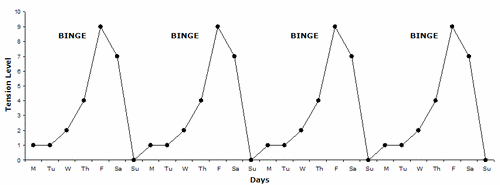Binge Drinking
Binge drinking refers to the consumption of large amount of alcohol
in a short time frame, usually over a couple of days, followed
by a non drinking period that may last for a week or two. Binge
drinking is physically and psychologically very harmful.
Physically, binge drinking puts your liver under extreme
pressure at different time intervals. For the liver it takes
about an hour to process 10 grams of alcohol (1 standard
drink). Since the body cannot store alcohol, drinking more than
the recommended level will cause the liver to work harder to metabolise
the ingested amount. After a binge drinking episode, the liver
gradually returns to normal functioning, only to be put under stress
by the next binge. This "on and off" pattern is extremely
damaging.
Psychologically, binge drinking leads to
an association that once formed becomes difficult to break. As
most binge drinking episodes occur on weekends, the pattern is easily
established. Most people we work with in our practice
report drinking excessively on Friday and/or Saturday nights, recovering
on Sunday, focusing on work and drinking minimal or no alcohol between
Monday and Thursday, and repeating the binge on Friday and/or Saturday.
This pattern leads to the development of a strong psychological
association between alcohol and relaxation, maintaining (and
often increasing) the magnitude of binge episodes.

Once
the association has been formed, people often think about and
plan for the weekend ahead (including drinking) by mid week. In terms of
stress, as the days go by binge drinkers experience an increase in tension
level and anticipate drinking to relax. For regular binge drinkers it is
often unimaginable to spend an entire weekend without alcohol.